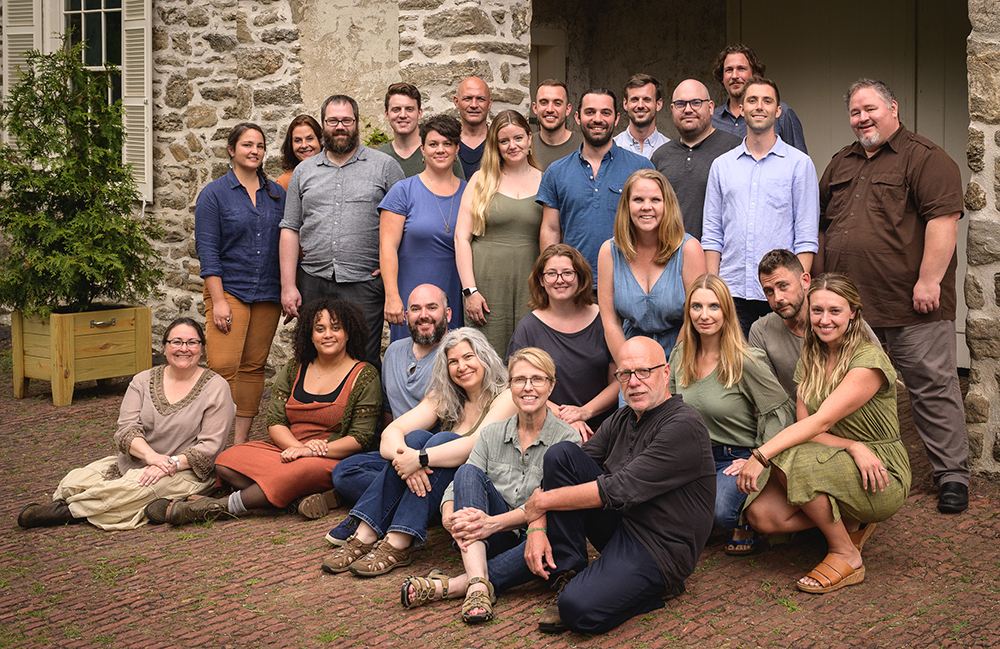
© John C Hawthorne
When COVID-19 shut down the world in 2020, The Crossing, the 24-voice choir that specializes in new music, came up with a typically unconventional way to make music together while apart. Using specially created amplification technology, with six-foot high pillar speakers and equipment designed to be carried by each singer, individual musicians spread out in the woods along a Pennsylvania nature trail to perform The Forest, a piece made up of ethereal murmurs and haunting solos reflecting the frightening isolation and strangeness of the time. For listeners wandering along the path in socially distanced pods, it was as though the trees themselves were singing.
The Crossing has always lived in the moment. Donald Nally, the ensemble’s conductor since the beginning, explains: “We treat our work as journalists, as if we are making a record of the time. We don’t have the answers. Our job, the job of art, is to describe and define our world.”
To do that, the group has commissioned around 170 works from a wide range of composers and on a dizzying variety of subjects. The Greek composer Stratis Minakakis, for example, wrote about Syrian refugees arriving in Lesbos in 2015; Edie Hill’s Spectral Spirits, a cantata about extinct birds, featured on the recording that won the group its third Grammy in 2023.
Nally describes Ted Hearne’s Farming, the staged centerpiece of the choir’s 2022-23 season, as “an hourlong, crazy romp through the topic of land ownership; basically, a dialogue between Jeff Bezos and William Penn.” David Lang, whose poor hymnal is scheduled for the 2023-24 season, is a regular collaborator. “It’s a deepseated friendship that’s rooted in art,” Nally says. “I trust that David is going to challenge us to deliver something incredibly raw, vulnerable, and truthful, where there are no shields at all.”
For about a decade, Nally headed several Philadelphiabased choirs plus the choirs of Italy’s Spoleto Festival, working with the same group of singers in all of them. In 2005, two years after he left Philadelphia for Welsh National Opera, a reunion concert with 18 of those singers elicited such a positive response that he and his co-founder, tenor Jeffrey Dinsmore, decided to keep going, and The Crossing was born. “Jeff and I decided, if we don’t have any goals except to get together and make cool music, why not make all of it new?”
The group’s distinctive sound was a function of Nally’s bent for early and contemporary choral repertoire. “A vibratoless sound allowed for the tuning and the interplay of lines—the rhetoric of lines with each other—to emerge in that music,” he says. “We can add vibrato for color, and often do add it for expressivity at the ends of long notes—just a little bit of shimmer.”
“We treat our voices literally as a total color palette: you can push it forward and make it steely and really bright. A lot of the topics we approach are not nice—we deal in social justice issues that are violent—so we make violent sounds. We can also pull back, darken it, make it soft and warm.”
Nine singers have been with the group since its first seasons; there is little turnover. Core singers do not reaudition. “In new music, you have to be able to take risks, to try things out, and not worry,” Nally says. “In the professional choral world, a bad project might be your last season. We don’t do that. We’re a collective that has each other’s backs. When a couple of us are at 75 percent, the rest make up for it. It’s unusual, and it means everybody knows each other really well.”
“If you’re going to make new music, who is in the room is the most important thing; that you know you are trusted and contributing, and it’s not going to happen without you. To build an ensemble that can make the kind of sound we do, whether it’s violence, anger, or joy, everyone has to know what the person next to them is going to do.”
In recent years, The Crossing has moved into theatrically staged projects. This season, it premieres David T. Little’s Sin-Eater, which Nally is also directing at Penn Live Arts. This past summer, they toured two such works to Europe: Robert Maggio’s Aniara—a choral theater work about the last spaceship of people leaving a dying Earth—and Ted Hearne’s Farming. For Nally, who worked in opera for 25 years, the theatrical element has always been a part of how he hears music. Thus, even The Crossing’s regular concerts include lighting and supertitles and build a narrative arc, in contrast to the more typical choral program of short, unrelated works.
Indeed, The Crossing’s overarching goal is to build a new canon of choral music, using American English, that tells today’s stories. This mission crystallized for them in 2014 when Dinsmore suddenly died of heart attack in the middle of a rehearsal at Walt Disney Hall in Los Angeles. “It changed everything,” Nally says. “Emotions ran high—everyone loved Jeff. We had to decide, are we going to go on? Over the next few months, I thought about it, and I was able better to define our purpose, which had grown organically. That evaluation happened as a result of Jeff ’s death, and we went on.” •
Heidi Waleson is opera critic of the Wall Street Journal and the author of Mad Scenes and Exit Arias: The Death of the New York City Opera and the Future of Opera in America (Metropolitan Books, Henry Holt and Company, New York, 2018).